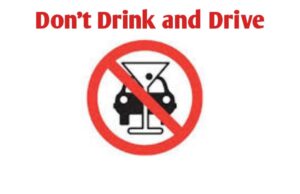Drinking and driving is sometimes called driving under the influence (DUI) or driving while intoxicated (DWI), and involves operating a vehicle with a blood alcohol content (BAC) level of at least 0.08 percent. However, even a small amount of alcohol can lead to harmful situations. Some drivers may not even show warning signs of being under the influence, but that doesn’t mean it’s any less dangerous.

How Blood Alcohol Content (BAC) Levels Affect Driving
A blood alcohol content (BAC) level of 0.08 percent is considered legally impaired. However, alcohol can start to affect many of your senses after only one drink. No matter the circumstances, you should never drink and drive. It’s not worth the risk of putting yourself and others in danger. According to the World health organization , Drink–driving increases the chance of a road traffic crash, as well as the likelihood that death or serious injury will result. The risk of impairment starts at very low levels of alcohol consumption and rises exponentially with alcohol intake. Drivers with a BAC of between 0.02 g/dl and 0.05 g/dl have at least a three times greater risk of dying in a vehicle crash. Only 34 countries, representing 2.1 billion people, have national drink–driving laws in line with best practice, i.e., BAC limit of less than or equal to 0.05 g/dl as well as lower limits of less than or equal to 0.02 g/dl for young and novice drivers.
10 Reasons You Should Not Drink and Drive
You Could End Up in Jail
No one likes to think about the prospect of going to jail, and for many people, being confined to a jail cell is a concept they can hardly imagine. But if you are caught drinking and driving, going to jail is exactly what might happen to you. And, if you cause any harm while drinking or driving – hit another person or cause property damage with your car, for example – jail time could very likely be longer than a night or two. In fact, if you cause a fatality you could spend many years in prison.
Your Insurance Premiums Could Increase
If you are caught while drinking and driving and cited for the act, do not be surprised if a DUI conviction directly affects your insurance premium. This is because insurance premiums are based, in part, upon your risk as a driver. A driver who is at a higher risk of being involved in an accident must pay a higher insurance premium. If you are convicted of driving while under the influence or driving while impaired, your insurance company will likely categorize you as high risk, and your premiums will skyrocket as a direct result.
You May Lose Your Job and Professional License
In many professions, a conviction of drinking while driving is a serious enough crime to result in employment termination or revocation of a professional license. This is even more likely if your position is one of esteem or prestige, or if you are employed by a municipal or state government. Doctors, nurses, lawyers, teachers, public figures, police officers and others may all be at risk of losing their job or license if they are caught drinking and driving.
You Could Incur Large Fines and Fees
One reason not to drink and drive is that getting a DUI is not cheap. Not only will you have to pay for the cost of the ticket, but you may also incur court fees and fines, civil penalties (if you cause injury or property damage to another party), and be forced to pay fees for reinstating your license.
Drinking While Driving Increases Your Risk of Being in an Accident
Perhaps the biggest reason to not drink and drive is that doing so significantly increases your risk of being in an accident, and therefore your risk of causing injury to yourself or to another person. According to Mothers Against Drunk Driving (MADD) 27 people die per day in America as a result of drunk driving crashes.
You Do Not Want a Criminal Record
If you are found to be guilty of drinking and driving, this information will be displayed on your criminal record, and could be viewed by future employers and others who require a criminal background check. Fighting criminal charges can be costly and your future opportunities may be severely limited if you are convicted.
You May Cause Serious Property Damage
Even if you do not cause physical injury to yourself or to another person, you may hit another object, resulting in thousands of dollars’ worth of property damage. Totaling your vehicle, hitting a stationary object, or causing damage to another person’s property simply is not worth the risk.
You Could Injure a Child
MADD also reports that drunk driving kills hundreds of children every year. In a single recent year, there were a total of 1,149 children ages 14 and younger who were killed in motor vehicle traffic crashes. Of those, 17 percent of fatal traffic accidents – or 200 fatalities – involved an alcohol-impaired driver. What’s more, another 29 children who were either pedestrians or riding a bike were struck by a driver with a blood alcohol concentration level of 0.08 or greater.
You Set a Bad Example for Others, Including Your Family
Drinking and driving does more than just put you and others on the road at risk – it also lets your loved ones know that you think that drinking and driving is acceptable. By failing to hold yourself to a safe standard, you are also telling those most dear to you that it is okay to drink and drive. If you care about the lives of your friends, family, and children, making it clear that drinking and driving is not acceptable is very important. SEE: Child of An Alcoholic (COA)
You Could Die and Leave Your Loved Ones to Suffer
Driving under the influence of alcohol is responsible for a significant number of deaths on our roads. Excessive alcohol use is responsible for more than 95,000 deaths in the United States each year, or 261 deaths per day. These deaths shorten the lives of those who die by an average of almost 29 years, for a total of 2.8 million years of potential life lost. When you think about it, driving is really complicated. You need total concentration, good coordination, rapid reflexes and to be able to make correct judgments and decisions. So it isn’t surprising that drinking alcohol diminishes that. There’s no such thing as safe drink driving. SEE: Alcoholic Dementia
- Every day, on average, 4 Canadians are killed and 175 are injured in impairment-related crashes. Annually between 1,250 and 1,500 people are killed and more than 63,000 are injured each year in Canada in impairment-related crashes.
- Drunk Driving is one of the biggest threats to Road Safety in South Africa. The country remains as one of the more dangerous countries for road safety, with 25.1 deaths per 100,000 population. Approximately 1 714 people die each year , which is the equivalent of 5 airplanes this on top of the 15% annual increase.
- According to the Australian Bureau of Infrastructure, Transport and Regional Economics (BITRE) as many as 388 Australians tragically die annually due to drink-driving. This is despite the fact that drink driving is treated as a serious offence and any person who is found to be operating a vehicle over the legal limit, may face penalties ranging from the suspension, disqualification or cancellation of their license, fines, or imprisonment for more serious drink driving.
- Between 3000 and 13 000 Kenyans lose their lives in road traffic crashes every year. The majority of these people are vulnerable road users – pedestrians, motorcyclists, and cyclists. In September 2017, alone, there were 128 cases of drink driving. SEE: New DOT Drug Testing Cutoff Levels 2019/2020






